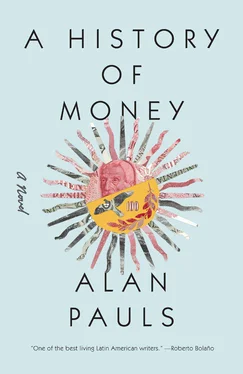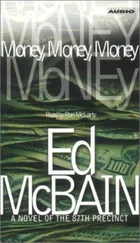And in this case, there’s also the matter of the money. Where is life — his father’s old question, which the dead man makes flesh, exposing it to the fragility and menace that color the world after every brush with misfortune — often gets mixed up with the other question, where is the money, which snakes through the wake in an undertone (in the way that vulgar, malicious, or funny conversation sometimes circulates in solemn and serious situations, deliberately disturbing the solemnity in order to make it more bearable, or maybe to remind us what cheap stuff it’s made of) and sparks a few deliberations when a guest appears who should theoretically be able to answer the question, someone high up at the iron-and-steel company, a police official, the two or three army and navy officers who arrive in uniform, preceded by a compact phalanx of guards, and who restrict themselves to squeezing the hands of anyone who approaches them as soon as they see them coming, as though they were the chief mourners — though they never met the dead man in person and they’re quick to leave as soon as they’ve stood at attention next to the coffin — and not the people who have been there for hours, wasting away in the sickly light of that apartment. Where. Where is the money.
They won’t be the ones to tell, if they even know the answer. There’s nothing to make them. The only person who could do that is the dead man, who might have found out before everybody else, when he goes up to the roof of the iron-and-steel company’s Buenos Aires headquarters, boards the helicopter sitting there with its blades spinning, sits down, and signals to his assistant to give him the attaché case containing the money, only to discover that the assistant is empty-handed and now closing the helicopter door with a slam and telling the pilot to take off. They were relying on him. He’s remained loyal to the company’s interests for how many years? Twenty? How many times has he saved them from using forceful measures? How many union leaders has he shut up? He’s the ideal man for this undertaking, the only one capable of understanding its exceptional nature, a nature that calls for emergency operating procedures justified by an equally exceptional situation that’s raging out of control. Nobody ever imagined that he would oppose out of principle, or that he even had his own principles independent of the company’s. But when the time comes, he objects to all of it: the means, the end, the very idea. His loyalty remains intact, but there are certain lines he is not willing to cross. It comes as a surprise. The real problem, which there’s no fixing, is that it also comes too late. It becomes clear not only that he won’t do it, but also that he knows too much. If it comes down to a loyal soldier with moral sensitivities and a perfect plan that will pacify the whole region and that comes with the government’s blessing, which are they likely to choose?
The money must be there. Not twelve hours after the family announces that the helicopter hasn’t arrived at its destination, a procession of vehicles a kilometer and a half long brings local police, federal agents sent from the capital, and a squad of select union thugs, in total some four thousand men in 105 vehicles (including private cars with no license plates, patrol cars, and assault cars), armed with long guns and kitted out with the accessories of intimidation that will inspire frenzy throughout the country for the next eight years — fake Ray-Bans, hoods, peaked caps, green or navy-blue berets — to Villa Constitución, the city once named the capital of the red belt of the Paraná River, to do away with a troublesome trade union group and uproot a subversive plot against the nation’s heavy industry — a task that from that moment on they’ll pursue almost unchecked, paid alternately by the chief of staff and the head of labor relations at the iron-and-steel company to the tune of a hundred and sometimes a hundred and fifty dollars each a day, and enjoying the use of the plant’s helipad for the police helicopters, the parking lots for their cars, the plant’s dining rooms for affordable lunches and dinners, the comfortable houses, originally meant for executives, for sleeping, watching television, and playing cards, and the workers’ lodgings for interrogations and torture and stockpiling the loot from their daily raids.
The money is there, but it can’t be seen, and he soon realizes that this is almost always the case. Maybe disappearing isn’t an unpleasant accident, one of many eventualities eagerly awaiting money, but actually its very logic, a fatal tendency it has. Maybe, he thinks, that’s the main similarity between money and life — more so even than the reproductive impulse, which they also share. It’s there, but it’s always embodied in or translated into something else: clothes, magazines, food, buildings, machines, school supplies, records, cinema tickets, thugs in dark glasses who stick their forearms out the window while they cock their Czechoslovakian guns. This is why he’s glad that his father prefers not to pretend and always walks around with his pockets full of banknotes: because he likes the anachronistic challenge this represents. He trusts only what he sees, and what he sees, what circumstances dictate that his father sees — just as others before him saw grains of salt, seashells, feathers, or gold — is printed paper.
One day not long after the afternoon when he sees his first dead person — a day on which his mother, with a certain gravity in her voice, arranges a formal meeting with him, saying she wants to “talk to him about something,” even though they live in the same house — he starts to wonder whether the compensation the crostini lover’s widow received from the iron-and-steel company — as exceptional and possibly as ample a consignment as that which should have been on board the helicopter and which in a way condemned the dead man to death, since it’s used to pay for the troops who are meanwhile turning mattresses over, stealing wedding rings, and ripping off testicles in Villa Constitución — is paid in cash. He’s wondering this at the exact moment his mother appears in the living room, freshly showered, with her head wrapped in one of the towel turbans that suit her so well, and hands him an envelope containing two typed pages, which she asks him to read and sign at the bottom.
It takes him a little while to understand what it is he’s reading. “In the event of an accident …” “compensation …” “as a result of which …” “through the stipulated premium.” It’s the archaic, severe, alien-sounding music of technical jargon. He recognizes the characters in this drama — beneficiary, policyholder, insurer — but it’s not so easy to identify the relationships the text establishes between them, or, more importantly, its directionality, who gives what to whom, who pays and who charges, what has to happen for so-and-so to do such a thing and such-and-such another. He gets lost in the middle of sentences. Every time he stumbles over an “aforementioned” or a “the same,” he has to go back and look for the previous use, but the path is tortuous and he gets lost. The only thing he recognizes is his own name typed in capitals, alone and faltering like an explorer lost in the woods. When he’s finished scanning the text, he looks up and meets his mother’s eyes, which are wearing an expression of weary impatience. How long has she been looking at him like that, with her turban coming undone on her head at a geologically slow pace, as if it were alive? She wanted his signature, that was all. She didn’t think he would read it. But she thought wrong, or she was thinking of someone else. He reads everything. Something need only come to him in writing for his interest to be awoken, no matter whether it’s dosage guidelines for medication, a flyer given to him on the street, a furious promise of sodomy scrawled on a bathroom wall, or the series of ominous auspices — fortune and prosperity for those who pass them on; ruin, pain, and failure for those who do not — that begin to appear on notes for five thousand pesos ley, the currency of the day. Why those and not the others is a question he often asks himself. Why not the red ten thousand bill, for example, or the hundred thousand one, with its exotic sheen, on which, though all the notes in the series use the same portrait of General José de San Martín — in three-quarter left-side profile, hair and mustache completely gray and a cravat around his neck: the Liberator in his European exile, confined to a rented room in Boulogne-sur-Mer — he looks slightly older and more bitter than on the fifty-thousand-peso bill and slightly less so than on the two-hundred-thousand-peso one, as if as the denominations rose they accompanied the hero on his journey toward death. Maybe, he thinks, it’s because these are the bills in mass circulation, the ones that are used in the commonest transactions; they’re the ones that pass through the most hands, and superstitious chains need this kind of fluid circulation in order to spread.
Читать дальше












